What Do Queer Cowboys Mean?
Brokeback Mountain is out here in Los Angeles, and to be honest, I’m terrified.
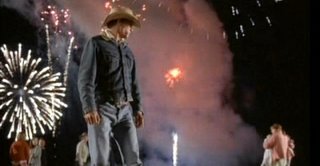
I’m a seventh generation Mormon. My family is scattered across the windswept intermountain West, where they settled after their forced migration from Illinois. The first train of Mormon pioneers to enter the Salt Lake Valley were lead by an ancestor of mine, and I lived in a neighborhood in Salt Lake that was named after my great-great grandfather. To me, the West is Zion, and I was raised with a sense of the holiness of these high, dry, mountains. At many troubling times in my life, I’ve returned to the West and sought the comfort of its granite shoulders. Be it my troubled sixteenth summer spent on an Idaho potato farm, our the lost years of my early twenties when I worked the ski resorts and relied on the power of the landscape for sustenance and order, I have a connection with the mountain West that runs to the bone.
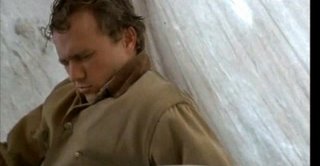
I also have bred in me the casual homophobia of the place. When I was in the closet, the small town rural life of the West to me was both an idyll of masculinity, and a talisman to ward off my own doubts that welled up from the consciousness of being gay. Even though I struggled to make my way in the wider world, attending school in the East, living in Los Angeles, as long as I was in the closet, I always had this idea in my mind of my mountain home as refuge, an escape hatch. I could, if I had to, run away to my rural past, and hide in the stern social discipline of a small town, far from temptation. Of course, I would have ended miserable, as miserable as the characters of Ennis and Jack in Brokeback Mountain. But as a young man, like them, I did not know that. I was sorely tempted by the seductive but brutal simplicity of the place, and the hopes that if I was just tough enough, toughened by the unforgiving landscape of the West, I could hide from myself in its long shadows.
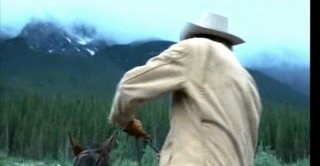
When I read Annie Proulx’s short story, if floored me, because it ripped off the false view I had of the sanctity of this land. That sanctity existed in ways I hadn't imagined. I had lived the myth of the West as Zion, and even though I had fled this refuge and accepted my nature, I still held in the back of my mind this conceit of Western purity, forged on the hard anvil of an unforgiving land. What was so disturbing about the story, and liberating, was that here was a different, though equally tough kind of purity; the relationship between Jack and Ennis has all the power of a natural communion, the kind of power that Mormons had also sought in the mountaintops.
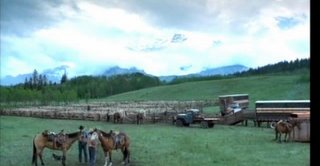
Outsiders don’t understand the impact the landscape of the West can have on you, the flayed loneliness of the place. It rips the protective hide from your back, and makes you more dependent on and susceptible to others. It tests you, and if you are lacking, it can be unmerciful. I won’t give anything away about the movie by saying that these two men in it are put to just that test, with disastrous results. But what kicked me in the gut was how, for that summer on the mountain, they were able to find it, that elusive refuge that people from time immemorial have sought in granite peaks.
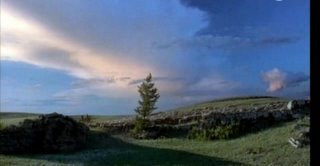
The Mormons sought to carve a refuge out of the West, a place where they could live, love, and believe as they sought fit. The power of Annie Proulx’s story is that its characters also seek a refuge, a place for two men to fall in love in this back breaking landscape. The landscape not just of the West, but of a nation and society that seeks to destroy them for what they are. I've learned as a Mormon and I've learned as a gay man, that sometimes, all we have is that moment alone on the mountain. Jack and Ennis are lucky in an untold fashion, that they had someone to share it with.
To see so many things I value, reflected in one place, scares the hell out of me. I’m afraid, that if I disappear into a dark theater to watch this film, I won’t ever come out again.
P.S. Well, I saw it. Read what I have to say.
P.P.S. Welcome Towleroad Readers. Please check out my newly released documentary, "Straight Acting" about gay men who play violent contact sports. You can find a summary of it here, read a review here and buy it here. It's a War On Christmas bargain at only $9.95!

I’m a seventh generation Mormon. My family is scattered across the windswept intermountain West, where they settled after their forced migration from Illinois. The first train of Mormon pioneers to enter the Salt Lake Valley were lead by an ancestor of mine, and I lived in a neighborhood in Salt Lake that was named after my great-great grandfather. To me, the West is Zion, and I was raised with a sense of the holiness of these high, dry, mountains. At many troubling times in my life, I’ve returned to the West and sought the comfort of its granite shoulders. Be it my troubled sixteenth summer spent on an Idaho potato farm, our the lost years of my early twenties when I worked the ski resorts and relied on the power of the landscape for sustenance and order, I have a connection with the mountain West that runs to the bone.

I also have bred in me the casual homophobia of the place. When I was in the closet, the small town rural life of the West to me was both an idyll of masculinity, and a talisman to ward off my own doubts that welled up from the consciousness of being gay. Even though I struggled to make my way in the wider world, attending school in the East, living in Los Angeles, as long as I was in the closet, I always had this idea in my mind of my mountain home as refuge, an escape hatch. I could, if I had to, run away to my rural past, and hide in the stern social discipline of a small town, far from temptation. Of course, I would have ended miserable, as miserable as the characters of Ennis and Jack in Brokeback Mountain. But as a young man, like them, I did not know that. I was sorely tempted by the seductive but brutal simplicity of the place, and the hopes that if I was just tough enough, toughened by the unforgiving landscape of the West, I could hide from myself in its long shadows.

When I read Annie Proulx’s short story, if floored me, because it ripped off the false view I had of the sanctity of this land. That sanctity existed in ways I hadn't imagined. I had lived the myth of the West as Zion, and even though I had fled this refuge and accepted my nature, I still held in the back of my mind this conceit of Western purity, forged on the hard anvil of an unforgiving land. What was so disturbing about the story, and liberating, was that here was a different, though equally tough kind of purity; the relationship between Jack and Ennis has all the power of a natural communion, the kind of power that Mormons had also sought in the mountaintops.

Outsiders don’t understand the impact the landscape of the West can have on you, the flayed loneliness of the place. It rips the protective hide from your back, and makes you more dependent on and susceptible to others. It tests you, and if you are lacking, it can be unmerciful. I won’t give anything away about the movie by saying that these two men in it are put to just that test, with disastrous results. But what kicked me in the gut was how, for that summer on the mountain, they were able to find it, that elusive refuge that people from time immemorial have sought in granite peaks.

The Mormons sought to carve a refuge out of the West, a place where they could live, love, and believe as they sought fit. The power of Annie Proulx’s story is that its characters also seek a refuge, a place for two men to fall in love in this back breaking landscape. The landscape not just of the West, but of a nation and society that seeks to destroy them for what they are. I've learned as a Mormon and I've learned as a gay man, that sometimes, all we have is that moment alone on the mountain. Jack and Ennis are lucky in an untold fashion, that they had someone to share it with.
To see so many things I value, reflected in one place, scares the hell out of me. I’m afraid, that if I disappear into a dark theater to watch this film, I won’t ever come out again.
P.S. Well, I saw it. Read what I have to say.
P.P.S. Welcome Towleroad Readers. Please check out my newly released documentary, "Straight Acting" about gay men who play violent contact sports. You can find a summary of it here, read a review here and buy it here. It's a War On Christmas bargain at only $9.95!

5 Comments:
From blogger Ron Franscell at http://underthenews.blogspot.com ...
Imagine what insights might be gleaned if we could send a Desert Storm Marine to review the movie “Jarhead” or a murder survivor to review “Capote?” Our readers would be treated to an intense “insider’s” perspective on the story — the story, not the filmmaking.
Tonight, director Ang Lee’s “Brokeback Mountain” — about two young gay cowboys in 1963 Wyoming — opens in a handful of big-city theaters. It will open in Houston on Dec. 16. For now, there are no plans for it to be shown in Southeast Texas ... not a big surprise.
At my newspaper, we asked Ron Douthitt, a novelist and screenwriter who also had a gay relationship in his youth, to reflect on the film, which he saw in a November screening. We hoped his perspective would add to our readers’ understanding of this controversial story in this film version of Pulitzer Prize-winner Annie Proulx’s short story and Pulitzer Prize-winner Larry McMurtry’s script. An excerpt:
"If you’ve ever felt the kind of love where the feeling so far transcended the sex, when spending time with that person anywhere is all that matters, then this story is for you. If you’ve ever shared the kind of love, when the thought of just knowing if the person with whom you share that bond is going to be safe and all right — with or without you around — allows you to sleep at night, then this story will touch you deeply. The only unusual element is that the story revolves around two men."
"Brokeback" is going to cause far more damage to the status quo than ANY Pride parade, queer politic, Supreme Court case, or ACTup styled demonstration. There will be a seachange in American views of gay love. Not unlike the film "Philadelphia" and its change in attitude towards AIDS, "Brokeback" will get a lot of married men, who are bisexual, questioning their being part of the "normal flock of sheep". I led a desperate life of quiet straight marriage for 25 years until one day I could no longer stand the pain and we split amicably. Ironically later my exwife came out as well. We spent 25 yrs trying to be heterosexual...we were not.
Andrew Sullivan once said that our greatest threat to the culture is partnering, buying a house in the burbs, and mowing our lawns like normal folk. The drag leather queens with naked asses in Pride Parades are "over there" and thus just silly, faggots who are out of our sight. I think "Brokeback" is going to shock people...hardly for the kissing scenes...but rather that two ordinary looking masculine cowboys would fall in love. The film seems to be very tame in terms of graphic depiction (the short story is pretty erotic in one paragraph) and this is a far more threatening image to Red State America than any gay porn flick. Far more troublesome. Because it is about LOVE not about sex.
Americans think of a penis in a rectum when they think of gay. "Brokeback" will change this image in their minds and it is a HUGE threat to the status quo.
Your discussion of the West intrigues me as I have written similar ideas about being from New Mexico.
Still, I am not yet convinced about Brokeback Mountain. In many ways, the short-story seemed like a retread of the tragic gay stories from fifties and sixties.
They're actually shepherds, not cowboys.
I used to be a real bi cowboy, so I like to be precise about these things.
Check out my blog about it:
Left Behinds: Bi Shepherds Not Gay Cowboys
I joined a site where i tried to put out my view on gays and race issues called belief net and i was shut out of the page as being to outspoken when there are gays (homos and blacks) making racist and homo attacks on whites and straights
Post a Comment
<< Home